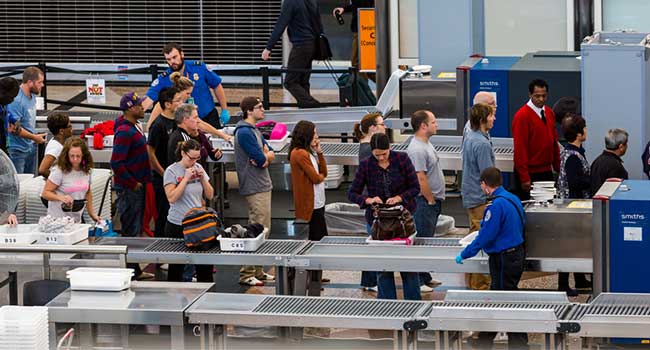
TSA Prepares for Summer Travel Demand and Higher Passenger Volumes
The Transportation Security Administration (TSA) is prepared for a busy summer travel season with anticipated passenger volumes that will match and may occasionally exceed those of 2019 for the first time since the pandemic began.
The continued recovery from the low travel volumes during the pandemic may require more patience and planning than was necessary before the pandemic. Checkpoint environments and procedures have changed to enhance screening operations, ensure the safety and well-being of the traveling public, and to minimize the spread of COVID-19.
“Daily passenger volumes at TSA checkpoints show that people are traveling again, and TSA is ready for their return. Our airport security checkpoints include 47,500 highly-trained security professionals and new technologies that enhance security and reduce physical contact,” said TSA Administrator David Pekoske. “We continue to recruit, retain, train and equip a highly-skilled workforce, and we work continuously with our airport and airline partners to anticipate and prepare for higher traffic patterns.”
Six airport and airline partners recently joined Pekoske during a media roundtable at Dallas-Fort Worth International Airport to discuss their operational preparedness for anticipated summer season travel volumes and key changes implemented to ensure safe, secure and healthy travel. They include Sean Donohue, Dallas Fort-Worth International Airport CEO; Nicholas E. Calio, President and CEO, Airlines for America; Kevin Burke, President and CEO, Airports Council International – North America; Todd Hauptli, President and CEO, American Association of Airport Executives; Paul Doell, Vice President of Government Affairs, National Air Carrier Association; and Faye Malarkey Black, President and CEO, Regional Airline Association.
The summer travel season, which begins in late May and extends beyond Labor Day weekend, covers three full months and four major holidays, which includes Juneteenth as the newest federal holiday. Juneteenth will be recognized on Monday, June 20, 2022.
Recent security enhancements at airport screening checkpoints include two new technologies. TSA deployed Credential Authentication Technology (CAT) and Computed Tomography (CT) scanners to improve identification verification, and in some airports, enable digital identification verification at the Travel Document Checker podium and the scanning capabilities for carry-on bags. Both of these technologies enhance security and reduce physical contact within the checkpoints.
To date, TSA deployed 1,621 CAT units to 176 airports. Among those, 90 CAT units are modified and equipped to read and verify digital identification. TSA also deployed 402 CT units to 163 airports nationwide. In March, the agency announced the award of two orders for the procurement and maintenance of additional base and full-size CT scanners to be installed at checkpoints during the summer months.
The CT units provide TSA officers the ability to review a 3D image of passengers’ bags and reduce the need to search the bag’s contents. Passengers screened in security lanes with CT units do not need to remove their travel-size liquids bag or electronics.
The new CT units are currently being installed at Billings Logan International Airport in Montana, Albany International Airport in New York, Buffalo Niagara International Airport in New York, Cincinnati/Northern Kentucky International Airport and Raleigh-Durham International Airport in North Carolina.
For those who choose to travel this summer, follow these five simple tips to get through the TSA checkpoint quickly and efficiently.
Tip 1: Face masks are optional, but recommended. The CDC recommends face masks for passengers aged two and older in indoor areas of public transportation and transportation hubs as an effective precaution for those who seek to avoid exposure to COVID in higher risk public spaces. CDC provides health recommendations for domestic travel during COVID-19 and for international travel on its website at CDC.gov.
Tip 2: Pack smart; start with empty bags. Airline passengers who pack for travel with empty bags are less likely to bring prohibited items through a TSA checkpoint. Technology and modifications help reduce the need for physical contact with TSA officers, but those who take time to come prepared for the TSA checkpoint are far more likely to avoid delay and physical contact. Check for prohibited items by using the “What Can I Bring?” page on TSA.gov.
Tip 3: Know before you go. Airports, like highways, have high traffic surges and construction delays. Plan to arrive at the airport in plenty of time to check in, check bags and complete security screening in time to avoid stressful sprints to the departure gate. At the TSA checkpoint, have a valid ID card readily available and follow the liquids rule of 3.4 ounces or less, with the exception of hand sanitizer, which has a temporary 12-ounce limit in carry-on baggage.
Tip 4: Contact TSA for help if there are questions or concerns. Those who are preparing to travel and may have special circumstances, considerations or general questions about airport screening can get live assistance by tweeting questions and comments to @AskTSA or via Facebook Messenger, daily from 8 a.m. to 6 p.m. EDT. You can also call the TSA Contact Center at 866-289-9673.
TSA also offers TSA Cares, a helpline for travelers with disabilities, medical conditions and other special circumstances. You may submit a request for assistance by calling TSA Cares at 855-787-2227, weekdays from 8 a.m. to 11 p.m. and weekends/holidays from 9 a.m. to 8 p.m. Passengers may also use the TSA Cares form available on the TSA website which can be found at https://www.tsa.gov/travel/passenger-support.
Tip 5: Enroll now in TSA PreCheck® to “Travel with Ease.” By enrolling in TSA PreCheck, airline passengers can avoid removing shoes, belts, liquids, food, laptops and light jackets at the TSA checkpoint. Most new enrollees receive their known traveler number within five days, and membership lasts for five years. In April, 94% of TSA PreCheck passengers waited less than 5 minutes at the checkpoint.